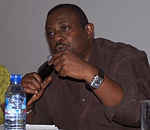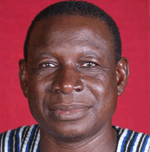Ghana
|
Source: . Published on Mon, 2011-09-12 11:46
Social Watch (SW), an international network of citizens devoted to eradication of poverty and an end to all forms of discrimination, has begun a three-year programme to improve the capacity of its members in developing countries through a series of workshops in Africa, Asia and Latin America. |
|
Published on Fri, 2011-09-09 10:19
Source: Ghana Nation A two-day African Regional Capacity Building Workshop for members of Social Watch Coalitions on the continent was held in Accra this week, with the aim to strengthen the capacity of members to actively monitor the implementation of social policies and programmes by their governments. |
|
Source: . Published on Wed, 2011-09-07 09:46
Accra, Sept. 7, GNA – A two-day African Regional Capacity Building Workshop for members of Social Watch Coalitions on the continent began in Accra on Wednesday. |
Published on Fri, 2011-09-02 07:24
Sources: BusinessGhana, ThinkGhana, Ghana Business News, MyJoyOnline, GhanaWeb, AllAfrica Several Ghanaian civil society organizations warned that the renewal of the interim Economic Partnership Agreement (EPA) between the country and the European Union (EU) will condemn the Western Africa integration process and the national economy to an irreparable doom. The Third World Network-Africa (TWN-A, focal point of Social Watch), the General Agricultural Workers Union (GAWU), the Integrated Social Development Centre (Isodec) and Abantu for Development, among other groups, said the government must not give in and sign an agreement which will be harmful to the long-term development goals and aspirations of the country. |
Published on Thu, 2011-08-18 07:49
Sources: Daily Guide, Business and Financial Times, Ghana Business News, X FM News Center. The Government of Ghana announced that it's studying tariff and non-tariff measures to restrict the importation of poultry products, after local analysts warned that those purchases are harming the national economy. "Imported chicken is being sold at below the cost of local chicken, and farmers in Ghana cannot simply compete, resulting in the collapse of dozens of farms and the loss of hundreds of jobs," said Yaw Graham, expert of the Third World Network-Africa (TWN-A), focal point of Social Watch. |
|
Published on Tue, 2010-11-16 14:44
The gender unit of TWN-Africa is hosting a round-table on gender and regional economic integration in Africa on 18-19 November, 2010, in Accra, Ghana. The meeting brings together scholars, feminist economists and gender experts, as well as policy-makers, to discuss issues of gender equity and Africa’s economic integration. |
|
Ghana’s dependence on foreign aid and international financial institutions over the last three decades or more has led to mass unemployment, huge balance of payments deficits and low manufacturing and agricultural output. The 1992 constitution and other national, regional and international instruments provide the legal basis and specific policies to enhance the welfare and protection of women and children. However, the Government’s minimal investment in education, health, water resources and rural development show the low priority it places on these goals. The likelihood of achieving the Millennium Development Goals by 2015 remains remote.
|
|
The global crisis has already wounded Ghana’s economy severely. Initial damage has included decreasing exports and remittances from abroad and galloping devaluation. The crisis is threatening to hamper efforts to reduce poverty, which had been registering successes. Government efforts to mitigate the impact of the crisis appear insufficient. The biggest challenge is to improve income distribution, since poverty is deeper in rural areas. Policies are urgently needed to strengthen agriculture, a sector that had been contributing almost 40% of the GDP.
|
SUSCRIBE TO OUR NEWSLETTER







